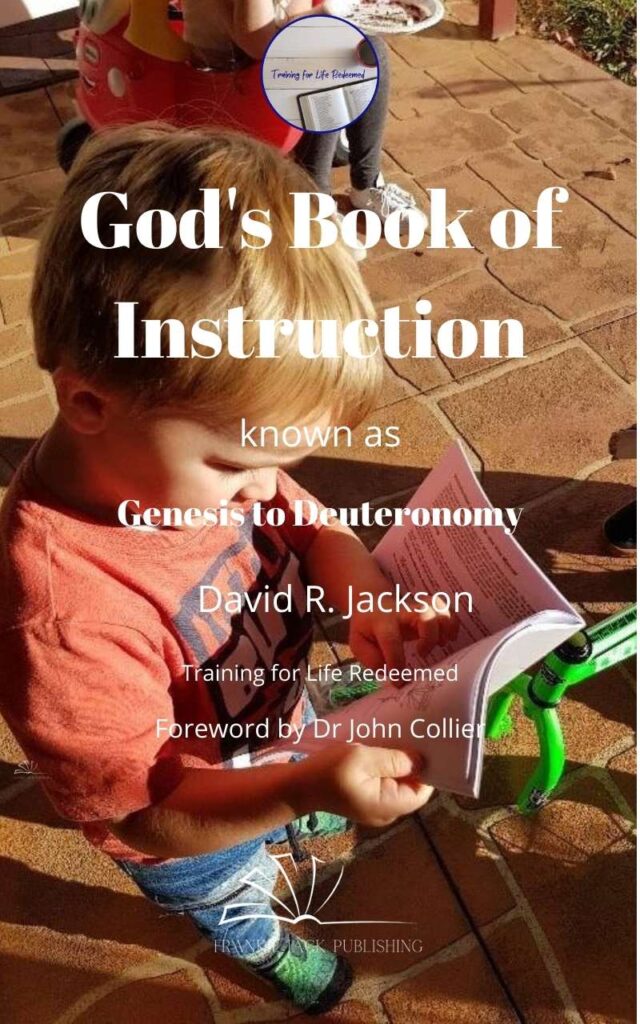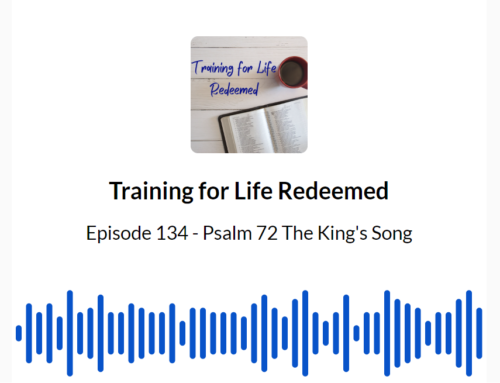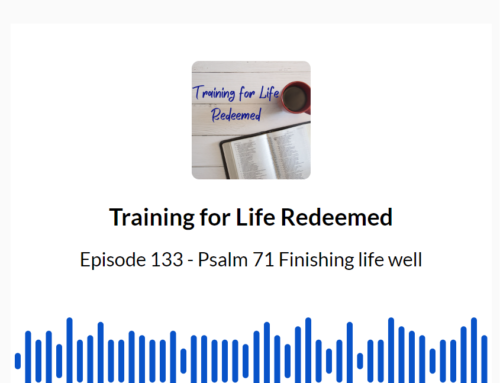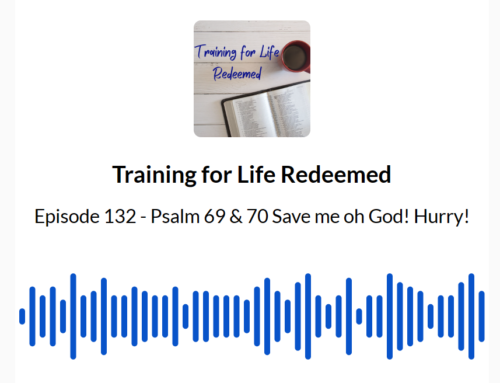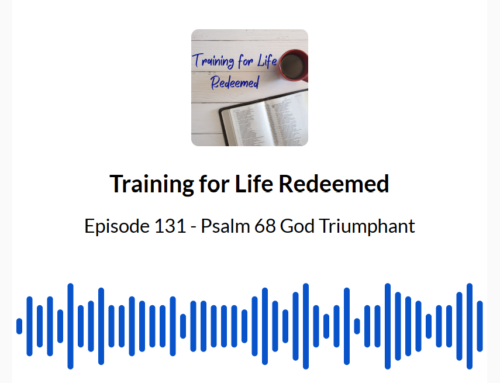Grab your notes for this episode by completing the form
and we will send you the link to all our notes.
Get the book “God’s Book of Instruction” on Amazon.
The first five books of the Old Testament constitute God’s book of instructions for his redeemed people. It reveals the character of God and his good design for life. It bears witness to the beginning of his work of redemption. It equips the believer to live in God’s world, God’s way, as God’s image for God’s glory. What sin and death have broken, God’s people can rebuild by keeping to his instructions by the power of his presence with us.
Transcript
Dan:
Hi, everyone. This is training for life redeemed, and we are up to episode 10. I’m Dan and I’m here with my dad, David Jackson. And in this episode, we are looking at Exodus 1 to 4 when Israel was enslaved in Egypt and God called Moses to explain how God was going to redeem them. So in our reading so far of Genesis, we have reached the point where Jacob and his family have moved down to Egypt because there was no food during the famine. And Joseph had been down there, making sure there was food to look after God’s promised people. And then the story jumps ahead 400 years. Everything starts out looking like Israel had arrived in their own little paradise. And then this crazy Pharaoh turned into a bit of a genocidal maniac. I think, as to what’s the problem he Dad?
David:
The problem is that , uh, after Joseph had rescued everybody from the famine , Israel, the Egyptians found themselves as slaves of Pharaoh while the Israelites were enjoying the best of the land and freedom. And they were getting rich and populating the country. And eventually somebody from Asia from the North knocked the Pharaoh over and took over the country. So for about 350 years, Egypt was ruled by foreigners. And just before the Moses story comes along an Egyptian general took matters into his hands, knocked over the foreign Pharaoh and took the country back for the Egyptians. So now we have a new regime in Egypt. They know nothing about Joseph. They don’t remember back that far. All they know is that they’re sick of foreigners running the country and they want their country back. In front of this. We now have a population of God’s people living on the best land and breeding like rabbits. And he’s not very happy about that.
Dan:
Yeah. I’m going to say, God has definitely fulfilled the first of the promises he made to Abraham. Now Pharaoh in this section comes across fairly ruthless. A bit terrifying. Yeah . It also looks like God’s kind of playing with him a bit here. So
David:
Yeah. One of the things I think God likes a certain way of doing sarcasm and he certainly mocks his enemies. So you have beautiful little lines . You’ve got some Hebrew midwives and Pharaoh tells them to kill the baby boys at birth. And they don’t. So their fear of God is greater than their fear of Pharaoh. And this is, you know, some, nobody women in this community standing up to the most powerful King, probably in the ancient world. And when he challenges them on why they didn’t do what they were told, this beautifully sarcastic line, well, our women aren’t like your women. When they give birth, they spit the kid out before we get there, whereas yours can’t actually even manage to get pregnant. It’s, you know, our God is with us and y ou’re hopeless and powerless and t hat, well, what do you expect us to do about it? And so there’s this constant niggling at P haros pride and power, and God i s mocking his enemies.
Dan:
Well, yeah. Then Pharaoh goes on to kill a whole bunch of babies. And anyway, regardless of the midwives and somehow your God looked after Moses. So it has him looked after and raised up and educated in the palace, but then Moses runs away after murdering someone. So he’s pretty, you know, he’s not the greatest person in the world, but while he’s out in the desert, I guess not quite desert, maybe I don’t, I don’t really know what that countryside looks like, but he meets God in a burning bush. It’s a fairly famous story. I think it’s in quite a few movies, actually, him meeting God in this bush, but it seems a bit weird why the burning Bush and the need to take off his sandals , what’s the go with the name that God gives. I am who I am. There’s a lot packed into this little conversation and it sounds like we’re supposed to know more than we do to understand everything.
David:
Yeah. When Moses wrote Exodus, it was obviously after he had spent 40 years growing up as a member of the Royal family, another 40 years, living out with a bunch of shepherds in the bush. And then he comes back, does the Exodus and sits down and writes this story up. So he’s writing with an Egyptian background and against all the Egyptian myths and gods and everything else he’s explaining to us who the real God is and the real God exists independently of the creation. Whereas all the Egyptian gods, there’s they’re sort of part of the story. Whereas God is the one who wrote the story. So God is, whereas these other guys, they’re part of the, the creation order. So to get that message across to Moses first. So he’s grown up with all these myths rolling around in his head. He knows there’s a Hebrew God. He knows t he rejection g ods to get God in his head on straight is this dramatic encounter. And if you take your shoes off, if you went into an Egyptian god’s temple, there were rituals you had to perform because you’re vulnerable before the gods. Taking your shoes off is basically a way of saying I’m here to be judged. I stand before the judge, the God who’s going to judge me. So t hat that’s an important part of Moses learning to submit to God. And the amazing thing i s he walks away and he’s still alive.
Dan:
Well, he, he does walk away, I guess, in the conversation, even like for his calling, he’s not, not overly willing, I guess, to go to go back to Egypt, to face a Pharaoh , he doesn’t look like a great example of faith. I don’t think this really at this point
David:
Now , he’s, I mean, it’s a bit of a challenge, isn’t it? He , he ran away from Egypt because everybody wanted to kill him. Pharaoh wanted to kill him. God’s people, weren’t all that friendly. They were going to dob him in. So he , he heads for the hills and 40 years out there. And you’re going to ask me to go back. He doesn’t know what’s going on back in Egypt. He doesn’t know what they’ll do to him in human terms for him to go back to Egypt. And they find out who he is. He’s got no hope. He’s got no guarantee that Israel would support him. And he knows the Royal family doesn’t want to know about him. So yeah, I understand why you’d want to make some excuses. The fact that he tries at six or seven times , does kind of indicate that faith is maybe as a mustard seed. It’s a tiny little thing in Moses and we’re going to need to build it up before he faces the most powerful man in all the world.
Dan:
It wasn’t just the fact that he had a long walk and he was 80 years old already .
David:
No, no mind you I’d like to be as fit at 80 as he was, but , yeah, no, this is, this is the beginning of Moses’s faith, u h , a nd trust and commitment to the Lord. whom, h e has met in this burning Bush that would have left a pretty good impression with him, but faith has to grow. If you’re going to go and face a challenge like Ph araoh, I think that’s the physical equivalent of maybe doing a triathlon or a marathon or even worse going into some weightlifting context. So I think there’s an analogy there between the way we would grow physical fitness and the way we would grow faith and seeing as how yo u’re t he PDH man. and you’re the one who taught this little, wh ole f e llow h ow to lift weights a long time ago. Maybe it would help to learn a little bit more about how we grow muscle and how that works when it comes to growing faith. So PD man tell us all about it.
Dan:
Sure. So essentially what that’s talking about is the idea of progressive overload. So basically the idea is that you will train at a particular intensity. So with weights, let’s say you’re just lifting 10 kilo dumbbells doing bicep curls or something. Let’s say you start at 10 kilos and you can lift that 10 times. And then you can’t lift it 11 times. But if you keep trading like that, every couple of days, you’ll be able to lift that 10 kilos. It’ll be too easy. You’ll be able to lift it 15 times, 20 times. And so you then have to increase the weight, increase the intensity in order to keep getting a training effect on your muscles so that they can keep growing. That’s the same for anything in any kind of training context, really, you have a level at which you can do and need to push yourself to that limit. And the longer you stay at that limit, your body will then adapt to that. And that then means that if you want to keep adapting and getting better, you have to increase the intensity at which you’re doing it with. I believe dad , you compare that to what’s happening here with Moses, where he’s going to basically have a low intensity testing that happens that then once he’s past that, and he can have a higher intensity testing and then a higher intensity testing as his faith grows and develops in response to that.
David:
Yeah, you’re you’re breaking the news to Moses as to who Yaheh is. And he ‘s, he’s standing there looking at this burning Bush, going, wow, this is great. And processing, you are the God who exists independently of the creation. That’s a lot to take in. And then he turns around and says, now go down and tell Pharaoh to let the whole state of all the people of Israel go. And Moses is g oing, what? This is taking my faith to a level th at’s s mashing it. And so you watch him go through, you know, I can think of this excuse an d t hat I’ ve g o t, u h , s omebody wrote a commentary on Exodus and following on from some other Bible passages. They called it here. I am send Aa ron. it’s a way of, you kn o w, I don’t want to do this. My faith isn’t strong enough for that. So God first he talks to him about it and he works him through getting it right. And then when he hits a wall, God just says, well , look, I’ll give you a miracle. Here you go. I’ll give you a miracle. I’ll give you a sign and that’ll convince you that you’re doing the right thing. And Moses is going, okay, give me a miracle. God says, when you’ve done, as you told I’ll meet you back here. If you live through this, you’ll know, I get my word. It wasn’t a lot of help. And so Moses processes this and says, okay, okay, we do it. And off he goes to do it just Aaron turns up to help, which is good. So now we’ve got a spotter on his faith. If he drops the ball there and I’ll help him catch it. And we go to the next step. And when we go to the next step, God is going to demonstrate to him and working through the next step till he’s firm on that. So he’s got to get down to Egypt, he’s got to face the Israelites. Their faith is going to crash as soon as he faces Pharaoh . And then God’s going to dump plagues in there and they’re going to go, Oh yeah, this might work. And gradually the faith is going to grow, but it’s going to get smashed several times along the way , just like my legs,
Dan:
Nothing like a leg day. It’s good for your body. All right . Well, that brings us to the end of episode 10, our first episode looking at Exodus and we just covered Exodus, w onder f or having a look at Moses, becoming a prophet, being sent by God, to Israel, and the fact that he needs to do a lot of training to develop his faith so that h e’s ready to encounter P haraoh and deliver the messages that God sent him to do. if you would like to get the show notes or the study notes as well, that go with this episode, head over to tradingforliferedeem. com/1 0, and you can grab the study notes for this episode. Make sure you subscribe so that you don’t miss out on episode 11. When we come back to Exodus and we look at Exodus five to 11, when God uses Moses to do a showdown with Pharaoh.
